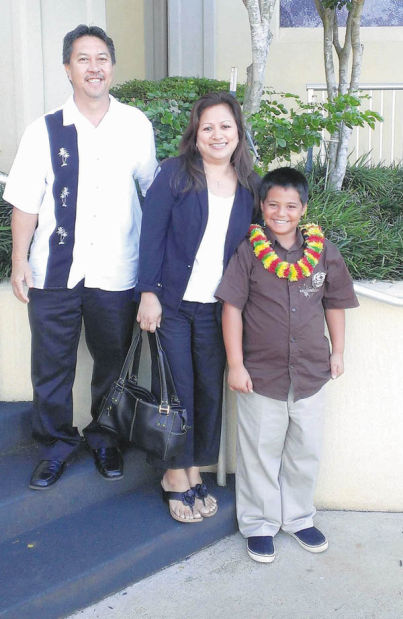Owen and Merna Tango laugh when asked why they are resource caregivers.
“We don’t know why,” they replied in our recent interview. “Some days we think we’re crazy, but then, deep down, we know the man upstairs has this in his plan for us. It’s part of our destiny, our purpose, to help these kids.”
The road to this destiny wasn’t easy. Merna grew up in the Philippines and came to Hawaii when she was 19. Her early years were filled with hardship and poverty. Owen was born and raised on Kauai. He was only a baby when his father died. One of 10 children, Owen was raised by his grandparents. Eleven years later, his grandfather died.
It is their childhood experiences that fuel the Tangos’ passion for fostering today.
“Being a resource caregiver isn’t easy,” Owen said. “It takes a lot of patience and perseverance. It’s all worth it though, when you see the positive changes. Sometimes it’s big things like the children do better in school, but often it’s little things, like an apology when I had never heard one before, or a boy sharing about his painful past for the first time, or a teen — who’d always been so tough — crying and telling me I’m the only one who’s been there for him. All of that keeps me going.”
“It’s taught me patience,” Merna said, “and has made me appreciate life. These kids have been through so much. I look at my life and think what a gift it all is. I’m so fortunate to have a loving husband, our two biological sons who are doing well, our home that we can share with the children. We’ve fostered five boys over the past 10 years. I’m so lucky. Parenting these children has been very meaningful.”
Abuse or neglect impacts a child’s ability to trust others, and regaining that trust doesn’t happen overnight. The Tango’s advice to potential resource caregivers? Give the children your time and energy, and let them know you’re with them every step of the way. Everyday activities like going out to dinner or playing sports may be something the children have never experienced. It’s important to give them guidance and encouragement as they learn new skills in an unfamiliar environment.
And don’t be afraid to get support from therapists and other resource caregivers. Accept help from family, friends, and others in your community. It’s a big job to raise foster children; letting others pitch in can make a real difference.
For the Tangos, their religious faith has been their bedrock support. They draw on their faith to give them courage and to keep their hearts open. When at a loss, their faith reminds them of their purpose.
“What surprised me,” added Owen, “is that the children have really become part of our family. Before doing this I didn’t think a non-biological child could really become that close, that there could be that deep attachment. But there is. I just know, no matter what, I can’t give up on these boys. Merna and I are there for them. Loving them has enriched our lives.”
If you would like more information on becoming a resource caregiver please call Hui Hoomalu on Kauai at 346-8184. For Oahu and other neighbor islands call: (808) 441-1117.
• Wilma Friesema, MFT, has written for a variety of publications and is currently focused on sharing the stories of the children and families involved with the child welfare system.



